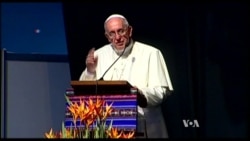Pope Francis has won praise from the political left and from environmentalists for saying that globalization is hurting the poor and contributing to climate change. But conservative Roman Catholics in America say his economic thinking is erroneous.
During his recent visit to Bolivia, Francis said greed has created a “subtle dictatorship” over the global economy. Quoting an early church theologian, he called the unfettered pursuit of money “the dung of the devil” and blamed it for a host of ills.
“It ruins society, it condemns and enslaves men and women, it destroys human fraternity; it sets people against one another and, as we clearly see, it even puts at risk our common home,” he told a meeting of grassroots activists in Santa Cruz with Bolivian President Evo Morales.
It was seen as a revolutionary call for help for those who have not benefited from globalization.
Stephen Schneck of the Catholic University of America in Washington said Francis “is on fire” with his concern for the poor. He said that comes from his experience as Cardinal Jorge Bergoglio, when as archbishop of Buenos Aires he spent time in the city’s villas miserias, or shantytowns.
“This pope is somebody who really came to this job as pontiff from the front lines, from working with some of the most marginalized people on the planet,” said Schneck, who directs CUA’s Institute for Policy Research & Catholic Studies.
“He’s not arguing against the market per se,” Schneck added. “What he’s arguing is that the market can’t be idolized. In other words, we can’t turn the market and its operations into some sort of an idol.”
The pope’s supporters say he is not advocating a Marxist solution. But his view is seen as a critique of the U.S. role in leading the global economy.
Speaking in Bolivia, Francis declared, “Let us say NO to an economy of exclusion and inequality, where money rules, rather than service. That economy kills. That economy excludes. That economy destroys Mother Earth.”
Kishore Jayabalan, an economist who formerly worked at the Vatican’s Pontifical Council for Justice and Peace and its mission to the United Nations, rejected the current pope’s claims.
“When the pope says that this economy kills, that this economy destroys the environment, I’m not quite sure what economy he’s talking about,” said Jayabalan, who now heads the Rome office of the conservative Acton Institute.
When the pope suggested globalization was a factor in the migrant crisis in the Mediterranean, Jayabalan said, he had it backward. The solution is not less globalization but more of it in the migrants’ countries of origin, he said.
“Poor people benefit from being part of this global economy, and the worst thing would be to exclude them and force them to become migrants, which is what’s happening today,” Jayabalan said.
On the flight back to Rome, Francis conceded that he had heard about such criticism, coming mainly from American conservatives, but that he hadn’t read it yet.
“Yes, I ought to study that criticism, no?” he said, noting that he will visit the United States in September.





